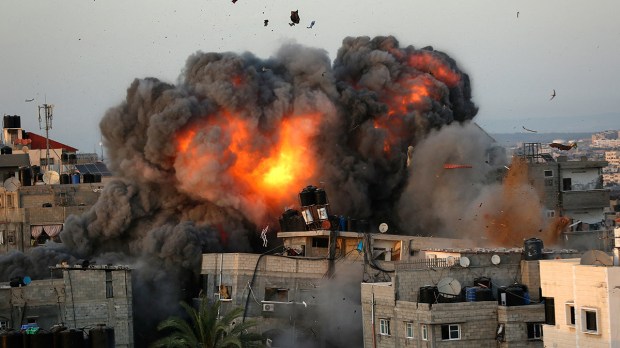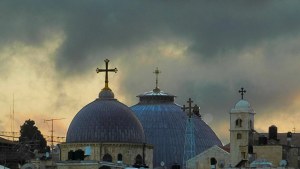Lenten Campaign 2025
This content is free of charge, as are all our articles.
Support us with a donation that is tax-deductible and enable us to continue to reach millions of readers.
The Vatican’s envoy to the United Nations expressed satisfaction over the recent ceasefire in the Holy Land and called on all sides to recommit to dialogue.
Archbishop Gabriele Caccia, the Permanent Observer of the Holy See at the United Nations, on Tuesday addressed the United Nations General Assembly Plenary Meeting on the Situation in the Middle East and the Question of Palestine.
“The Holy See reiterates that the only way to achieve the long-awaited, two-State solution is by means of persistent, genuine and mutually respectful political dialogue,” Archbishop Caccia said. “The support of the international community is crucial, especially from those parties who can assist Israeli and Palestinian authorities to reach an agreement, including on the question of Jerusalem and other final status issues.”
He said that the recent violent clashes in many Israeli cities, as well as confrontations between Israelis and Palestinians in the West Bank, “constitute a serious wound to peaceful coexistence and fraternity among the citizens, which will be difficult to heal if dialogue between the parties is not resumed. We encourage the relevant authorities to use proper and just means to address these tensions.”
According to the New York Times, hostilities began May 10, when “weeks of simmering tensions in Jerusalem among Palestinian protesters, the police and right-wing Israelis escalated, against the backdrop of a longstanding battle for control of a city sacred to Jews, Muslims and Christians.”
The root of the violence was an “intense dispute over East Jerusalem, which is predominantly Palestinian,” the Times said. “Protests had gone on for days ahead of a Supreme Court ruling, originally expected on May 10 but then postponed, on the eviction of several Palestinian families from East Jerusalem. Israeli officials described it as a dispute over real estate. Many Arabs called it part of a wider Israeli campaign to force Palestinians out of the city, describing it as ethnic cleansing.” The Times detailed:
The protests sharply intensified after Israeli police prevented Palestinians from gathering near one of the Old City’s ancient gates, as they have customarily done during the holy month of Ramadan. The police responded on May 10 by raiding the Aqsa Mosque compound, one of Islam’s holiest sites, to keep Palestinian protesters from throwing stones, they said. Hundreds of Palestinians and a score of police officers were wounded in the skirmish.
Militants in Gaza then began firing rockets in Jerusalem’s direction, to which Israel responded with airstrikes on Gaza. Barrages by both sides intensified through the week, as did casualties.
In Gaza, at least 230 people, including 65 children, were killed, while in Israel at least 12 Israeli residents, including two children, died, the Times reported.
In his speech at the United Nations, Archbishop Caccia called attention to the humanitarian situation. “Faced with the increasing humanitarian needs, it is important that all relevant actors play their part to alleviate the exacerbated suffering of the civilian population greatly affected by the recent hostilities,” he said.
Last week, Pope Francis also said he was glad to hear about the ceasefire and asked Churches around the world to pray for peace in the Holy Land.
“I thank God for the decision to halt the armed conflicts and acts of violence, and I pray for the pursuit of paths of dialogue and peace,” the pope said May 21, the day the ceasefire went into effect between Hamas and Israel.


